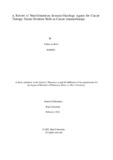| dc.contributor.advisor | Islam, Farzana | |
| dc.contributor.author | Ratu, Tabassum | |
| dc.date.accessioned | 2024-01-02T04:56:44Z | |
| dc.date.available | 2024-01-02T04:56:44Z | |
| dc.date.copyright | 2022 | |
| dc.date.issued | 2022-02 | |
| dc.identifier.other | ID 16346022 | |
| dc.identifier.uri | http://hdl.handle.net/10361/22045 | |
| dc.description | This thesis is submitted in partial fulfillment of the requirements for the degree of Bachelor of Pharmacy, 2023. | en_US |
| dc.description | Cataloged from PDF version of thesis. | |
| dc.description | Includes bibliographical references (pages 39-45). | |
| dc.description.abstract | The main aim of cancer immunotherapy treatment is to increase body’s own immune system to wreck the tumor cell, and to reboot the immune system, enabling it to attack the tumor cells.Cancer immunotherapy along with Adoptive T-cell, Immune checkpoint inhibitors, Combination treatment has apparently well-established method for treating malignant melanoma as well as different malignancy. Despite having immense clinical evidence over different cancers, immunotherapy treatment methods have demonstrated a little impact for cancer patients. In reality, thus it is evident that some of the patients shows relatively low responses because of immunological disorder. Fortunately, in recent times a combination of cancer immunotherapy along with other cancer treatments have shown tremendous result in clinical tests as well as the pre-clinical studies. In this article, four different types of immunotherapy techniques Adoptive T-cell, Monoclonal antibody, Immune checkpoint inhibitors, Vaccination have been reviewed. Furthermore, this project work attempts to look into the new directions in which immunotherapy is shifting and in future cancer patients can be benefitted. | en_US |
| dc.description.statementofresponsibility | Tabassum Ratu | |
| dc.format.extent | 45 pages | |
| dc.language.iso | en | en_US |
| dc.publisher | Brac University | en_US |
| dc.rights | Brac University theses are protected by copyright. They may be viewed from this source for any purpose, but reproduction or distribution in any format is prohibited without written permission. | |
| dc.subject | T-Cells | en_US |
| dc.subject | Immuno-Oncology | en_US |
| dc.subject | Antigen | en_US |
| dc.subject | Antibody | en_US |
| dc.subject | WBC | en_US |
| dc.subject | Checkpoint inhibitor | en_US |
| dc.subject | Tumor | en_US |
| dc.subject.lcsh | Cancer--Treatment. | |
| dc.title | A review of next-generation immuno-oncology agents for cancer therapy: recent dictation shifts in cancer immunotherapy | en_US |
| dc.type | Thesis | en_US |
| dc.contributor.department | School of Pharmacy, Brac University | |
| dc.description.degree | B. Pharmacy | |

